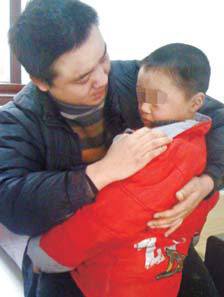Hot Issues
Stolen boy home thanks to micro blogs
Updated: 2011-02-09 06:37
By Chen Jia, He Dan and Zhu Zhe (China Daily)
BEIJING — An unprecedented large-scale online campaign to help parents find their missing children achieved its first big breakthrough on Tuesday, reuniting a father with his 6-year-old son who had been missing for three years.
Peng Gaofeng, a 30-year-old from South China’s Shenzhen city, burst into tears on Tuesday afternoon at the sight of his son in Pizhou city in East China’s Jiangsu province, which is more than 1,000 km from Shenzhen.
"He’s my boy. It couldn’t be wrong. He still recognizes me and knows how to speak our hometown dialect," Peng told China Daily over the phone on Tuesday evening while waiting for the DNA test results that will prove the wonderful news.
His son, Peng Wenle, was kidnapped from Shenzhen on March 25, 2008, and the family had been trying every thing it could think of ever since to get him back.
"It’s a miracle, a miracle that could not be true without the help of netizens," the father said.
"I’ve opened 13 blogs on the Internet and pasted my son’s photo everywhere online, including the micro blogs at sina.com. Now, the efforts have paid off."
|
 |
|
Peng Gaofeng hugs his 6-year-old son on Tuesday at a police station in Pizhou city, East China’s Jiangsu province, after he was reunited with the boy who was kidnapped in March 2008. [DENG FEI / FOR CHINA DAILY] |
He said he received an unnamed netizen’s mobile phone message, including a photo of his son, on Feb 2, the Chinese new year eve, and rushed to Pizhou to rescue the boy with the help of local police.
His son is believed to be the first missing child to be reunited with his family thanks to a campaign launched by netizens on micro blogs at sina.com on Jan 25.
Yu Jianrong, a professor with the Chinese Academy of Social Sciences and the initiator of the campaign, called for netizens to take snapshots of children they see begging in the street and of other children they think might have been kidnapped. The netizens can then post the photos on the micro blogs in the hope that family members will see them.
By Tuesday, more than 83,000 netizens had participated in the campaign, and there were 588,870 entries about the campaign on micro blogs at sina.com by Tuesday evening.
Yu said on his micro blog that he was prompted to act after he got a letter from a desperate parent whose child had been abducted and who turned to him for help.
He said he would like to see the elimination of child begging by outlawing the practice and wants to help more families reunite with their missing children.
Th e campaign has received nationwide attention and been the subject of widespread discussion and has received support from officials from the Ministry of Public Security, as well as the country’s legislators and political advisers.
"We’ve noticed the online campaign and appreciated it," Chen Shiqu, director of the ministry’s office that tackles human trafficking, said over the phone on Tuesday.
"Every citizen is welcome to provide clues," he said. "I’ll urge local police departments to follow the clues on the micro blogs." On Tuesday morning, Chen also put a picture of Wu Zhenglian, a toplevel suspect thought to be involved in kidnapping, on his micro blog at sina.com in the hope that netizens will help with his capture.
Chi Susheng, a deputy to the National People’s Congress (NPC), and Han Hong, a member of the National Committee of the Chinese People’s Political Consultative Conference (CPPCC), have also contacted Yu and expressed their interest in submitting a proposal to ban child begging and severely punish human-traffickers during this year’s NPC and CPPCC plenary sessions in March.
Yang Peng, secretary-general of the Shenzhen-based One Foundation, said his organization will also consider launching a specific project offering help in rescuing children who have been forced to beg on the streets, according to a report by the Xiaoxiang Morning Post.
Zhang Zhiwei, a lawyer and volunteer with the non-government organization Baby Come Home, said the rapidly expanding campaign shows that micro blogs are exerting an increasing influence on society and that they can play a role in altering legislation and policies.
However, he emphasized that such online activity needs to be better coordinated with government departments and professional NGOs because the increasing number of photos will mean nothing without professional sorting, analysis and comparison.
Some netizens have also expressed concerns about the potential risks taken by volunteers taking photos and the children who are photographed.
Wang Xiaoshan, a well-known critic and writer, wrote on his micro blog at sina.com on Monday that human traffickers may take revenge on people taking the photos and on the abducted children whose vital information is exposed.
Wang suggested that netizens do not post clear pictures of the young beggars or reveal their own identities.
And even for Peng, who has now finally seen his son aft er 1,050 days, the nightmare is not over.
"I’m worried about whether my son will be willing to go home with me," the father said, sadly. "One of his neighbors told me the boy might want to stay."
"I want help from psychologists on how to erase the memory of the past three years from my boy’s mind."
Specials

Spring Festival
The Spring Festival is the most important traditional festival for family reunions.

Top 10
A summary of the major events both inside and outside China.

A role model
Alimjan Halik had been selected as the "Cyberspace Personality Who Moved the Hearts of the Chinese in 2010".